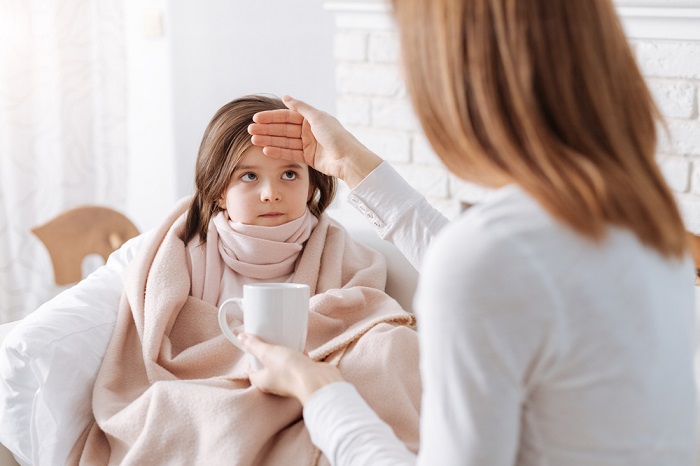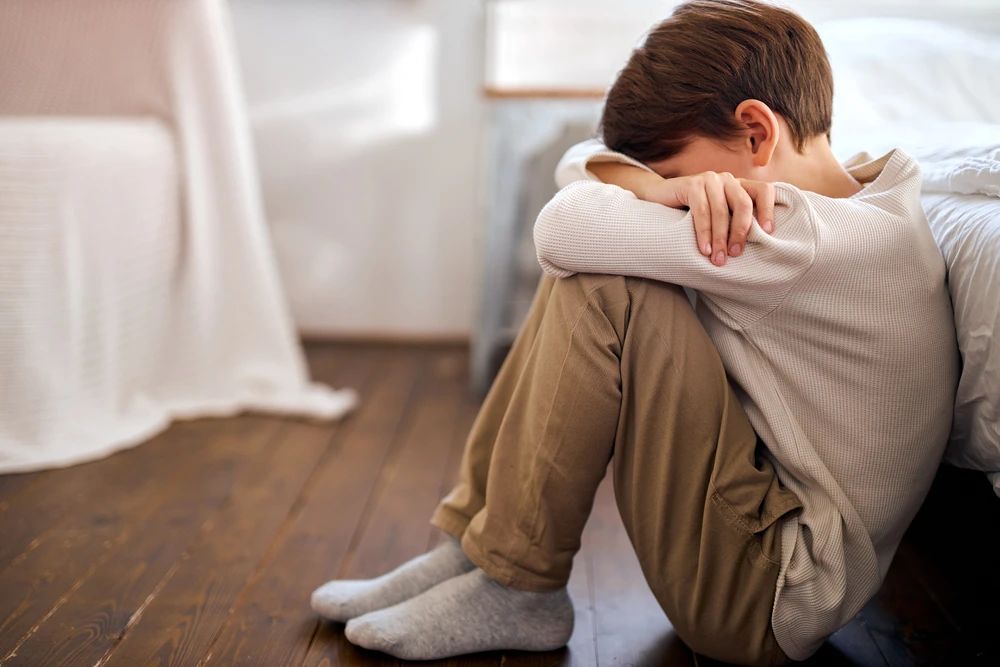What to Do When My Child is Sick Before Go to the Doctor?
2021-09-01

How can you help your child feel better when he/she isn’t well, yet not sick enough to go to the doctor?
As parents, we do our best to protect our children from getting sick. However, despite all your good efforts, your child can still get sick. Especially since children – especially those attending childcare and pre-school – can be exposed to disease-causing germs and viruses.
Even babies may catch 8 or more colds during their first year alone, and your child is likely to experience something similar.
How to tell if my child is sick?
Children under 3 years of age may not always be able to verbalize how they feel. This often means that a sudden change in their behavior is often the first sign of trouble. Look out for increased crying, fussiness, a loss of appetite and reduced activity levels as telltale signs that your child may not be feeling well.
How to care for a sick child?
You may want to check in with your pediatrician and follow all the treatment instructions given. Beyond that, you will just have to let the illness run its course, especially if the symptoms are mild. In the meantime, here are some ways parents can soothe their child and help them feel more comfortable.
1. Give your child lots of rest
Your child needs plenty of sleep and rest to help him/her recover. Try to give your child more time to nap, and put him/her to bed early. During your child’s wake time, engage in quiet activities. Avoid activities that are too stimulating. It is also helpful to limit visitors, since this may expose your child to more germs and viruses, as well as interfere with his/her rest.
2. Give plenty of fluids
When your child is sick, he/she generally needs more fluids than usual. This is particularly important when your child has diarrhoea. When your child has frequent loose stools, encourage him/her to breastfeed, take formula or other fluids to avoid dehydration.
Children who have fever also need more fluids as a higher body temperature can cause a sharp increase in the amount of water lost through the skin. Increasing liquid intake among young children who have cough and colds will also help loosen the phlegm and mucus, and help them feel better.
3. Clear your child’s nose
Children with clogged noses will feel irritable and may have difficulty feeding or getting a good night’s sleep. You can help your child feel more comfortable by clearing his/her nose using saline drops. Put 2 – 4 drops in each nostril and then use a nasal syringe or aspirator to clear the nostril.
Avoid inserting cotton swabs and twisted tissues inside your child’s nose as they may cause trauma or get stuck inside the nose. Do not give over-the-counter cough and cold medicine to your child without first consulting your doctor. Some medications or dosages may not be suitable for children younger than 2 years of age.
4. Keep your child’s temperature down
If your child has fever, you can help him/her feel more comfortable by keeping the temperature down. To do this, dress your child in light clothing. Avoid swaddling your child with thick blankets and keep your child’s room cool.
Give your child lukewarm sponge baths. Do not use cold or iced water, and avoid sponging your child for more than 30 minutes at a time. It is also important to dry your child off immediately after to avoid the chills.
Contact your pediatrician if your baby is younger than 3 months of age and running a fever above 38°C. Your doctor may prescribe paracetamol infant drops to be given at 4 to 6 hour intervals. Make sure that you give the correct dose to your child, according to his or her weight. Always check with your doctor to verify the instructions that come with the medication.
5. Provide plenty of hugs and comfort
Soothe your child by giving him/her extra care and attention. Snuggle up with your child and talk to him/her softly and gently. Give your child a soft massage to ease any aches or pains and ease him/her into a better night’s rest. If you are still nursing, allow your child to breastfeed as often as he/she likes. Breastfeeding a sick child provides fluids, nutrition and comfort.
When should I see a doctor?
See a doctor if you have any concerns or questions regarding your child’s health. Do not delay consultation when your child has the following symptoms:
Fever
If your child is less than 3 months old, consult a doctor immediately if his/her body temperature is higher than 38°C.
For babies older than 3 months, consult a doctor if the temperature is higher than 39°C. Our body temperature rises naturally at night, so a fever that was slight during the day can spike while sleeping. Parents should continue to monitor your child’s fever throughout the night. As a general rule, you should always get medical help if your child has a fever of any kind for more than 3 days.
A persistent cough and cold
The common cold usually lasts 10 – 14 days and resolves on its own. If your child’s cough and cold symptoms persist for more than 10 – 14 days, consult a doctor.
It is also advisable to consult a doctor if your child has forceful cough that is accompanied by vomiting.
Diarrhea
See a doctor if your child has very frequent loose or watery stools that already outnumber the times that your child drinks or feeds.
Look out for signs of dehydration, which include having less wet diapers due to less urine than usual, no tears when crying, a dry mouth and sunken eyes. A sunken soft spot on top of the head or fontanelle, when accompanied by other symptoms, can be a sign of dehydration or malnutrition.
Rashes
Consult a doctor if rashes begin to appear on large area of the body, or if your child has troublesome symptoms such as itchiness that interfere with sleep or feeding. Look out for signs of infection on the rash, such as pus formation and intense redness of the skin.
Seizures
Seizures can be frightening for parents to witness. But should one happen, keep track of how long it lasts and have your child evaluated by a doctor as soon as possible.
There are many possible causes of seizures in children. A very common cause is due to high fever, called “febrile seizures”. To manage a seizure, gently lay the child on the ground on the side. This is important so that your child will not choke on his/her own saliva or vomit. Remove nearby objects so that your child will not bump into them during a seizure. Avoid choking by not placing anything inside your child’s mouth or offering any food or drink.
Monitor your child’s symptoms and behavior closely to determine how sick they are. Bring your child to the nearest accident and emergency department if you are worried, or if your child’s sickness or fever is accompanied by any of the following symptoms:
- Breathing difficulties (fast breathing, flaring of nostrils, in-drawing of chest, pale or bluish lips)
- Unable to breastfeed or take in liquids
- Unusually sleepy
- Very irritable and difficult to console
For more information or to make an appointment with a Pediatrician, please contact 400-819-6622.
Article reviewed by Dr. Dacy Wang, Pediatrician at ParkwayHealth

Copyright: https://www.mountelizabeth.com.sg/healthplus/article/sick-child-what-to-do
References:
Common cold in babies, retrieved on 20 September 2020 from https://www.mayoclinic.org/diseases-conditions/common-cold-in-babies/symptoms-causes/syc-20351651. (21 May 2019).
Sick baby? When to seek medical attention, retrieved on 20 September 2020 from https://www.mayoclinic.org/healthy-lifestyle/infant-and-toddler-health/in-depth/healthy-baby/art-20047793 (13 August 2019)
Colds in children, retrieved on 20 September 2020 from https://www.ncbi.nlm.nih.gov/pmc/articles/PMC2722603/. (October 2005)
Common Cold in Children, retrieved on 20 September 2020 from https://www.stanfordchildrens.org/ens/topic/default?id=upper-respiratory-infection-uri-or-common-cold-90-P02966. (n.d.)
Infant colds: What’s normal and what’s not, retrieved on 20 September 2020 from https://news.sanfordhealth.org/childrens/infant-colds-whats-normal-and-whats-not/. (3 January 2020)
Adler LC, DiMaggio J. Diarrhea in infants, retrieved on 20 September 2020 from https://medlineplus.gov/ency/patientinstructions/000691.htm. (3 July 2019)
When to Give Kids Medicine for Coughs and Colds, retrieved on 20 September 2020 from https://www.fda.gov/consumers/consumer-updates/when-give-kids-medicine-coughs-and-colds (27 November 2018)
Cronan KM. First Aid: Seizures, retrieved on 28 September 2020 from https://kidshealth.org/ens/parents/seizures-sheet.html. (July 2018)





























